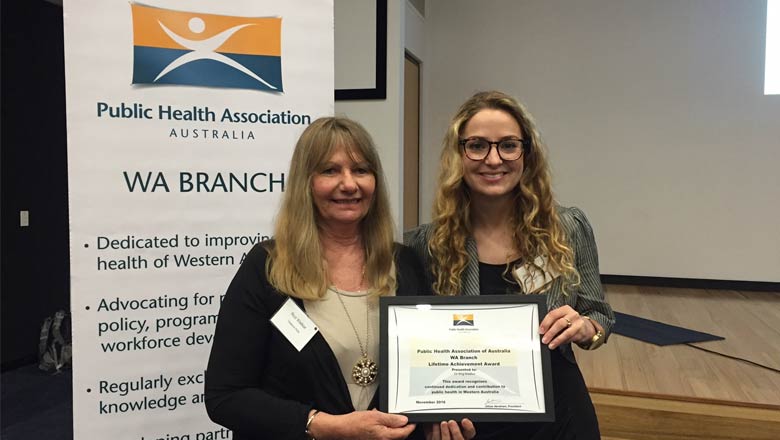Search

News & Events
The Kids researchers honoured at Public Health Association AwardsTwo The Kids researchers working to improve the health & wellbeing of Aboriginal children & their families have both been honoured at the PHAA Awards.
Research
Reduction in hypoglycemia with the predictive low-Glucose management system: A long-term randomized controlled trial in adolescents with type 1 diabetesShort-term studies with automated systems that suspend insulin when hypoglycemia is predicted have shown a reduction, but safety and efficacy aren't established
Research
Performance of medtronic hybrid closed-loop iterations: Results from a randomized trial in adolescents with type 1 diabetesThis study investigates the performance of an iteration of the Medtronic hybrid closed-loop algorithm
Research
Childhood leukaemia in Down's syndrome primed by blood-cell biasAn in-depth investigation of gene regulation and cell populations at sites of fetal blood-cell production provides clues as to why children with Down’s syndrome are predisposed to developing leukaemia.
Research
The effect of oral insulin on subcutaneous insulin requirements and glycaemia in T1DMLiz Tim Davis Jones MBBS FRACP PhD MBBS DCH FRACP MD Co-director of Children’s Diabetes Centre Co-head, Diabetes and Obesity Research Co-director of
Research
The development, content and response process validation of a caregiver-reported severity measure for CDKL5 deficiency disorderCDKL5 Deficiency Disorder (CDD) is a severe X-linked developmental and epileptic encephalopathy. Existing developmental outcome measures have floor effects and cannot capture incremental changes in symptoms. We modified the caregiver portion of a CDD clinical severity assessment (CCSA) and assessed content and response-process validity.
Research
Does somatosensory discrimination therapy alter sensorimotor upper limb function differently compared to motor therapy in children and adolescents with unilateral cerebral palsy: study protocol for a randomized controlled trialBesides motor impairments, up to 90% of the children and adolescents with unilateral cerebral palsy (uCP) present with somatosensory impairments in the upper limb. As somatosensory information is of utmost importance for coordinated movements and motor learning, somatosensory impairments can further compromise the effective use of the impaired upper limb in daily life activities.
Research
Functional outcomes in children and adolescents with neurodisability accessing music therapy: A scoping reviewTo determine the evidence for functional outcomes experienced by a population with paediatric neurodisability (such as acquired brain injury, cerebral palsy, spinal cord injury, and other neurological disorders), who access music therapy through neurorehabilitation services across the rehabilitation spectrum.
Research
Key elements of Goal-Directed Training for children with cerebral palsy: A qualitative content analysisGoal-directed training is an evidence-based occupational therapy intervention for children with cerebral palsy targeting motor performance and goal attainment. There is variability and limited description on goal-directed training delivery within the studies who found it a successful intervention. The aim of this study was to establish the who, what, why and how of goal directed training according to practicing occupational therapists.

Research
Exploring Oral Health Related Quality of Life in Rett Syndrome Using Directed Content AnalysisNo validated oral health-related quality of life (OHRQOL) instrument currently exists for those with severe intellectual and developmental disabilities and who communicate non-verbally. This qualitative study aimed to explore the domains that were important to the oral health-related quality of life in individuals with Rett syndrome.
Research
ACE inhibitors and statins in adolescents with type 1 diabetesWe hypothesized that adolescents with high levels of albumin excretion might benefit from ACE inhibitors and statins, drugs that have not been fully evaluated
Research
Eating and drinking abilities and respiratory and oral health in children and young adults with cerebral palsyTo investigate the potential risk factors of respiratory illness (ethnicity, oral health, and eating and drinking ability) in children and young adults with cerebral palsy.
Research
Home-based vs inpatient education for children newly diagnosed with type 1 diabetesWith adequate support, children newly diagnosed with Type 1 Diabetes can be safely managed at home following practical skills training
Research
A 10-second sprint does not blunt hormonal counter-regulation to subsequent hypoglycaemiaA 10-second sprint is unlikely to blunt the subsequent hormonal counter-regulation to hypoglycaemia in individuals with Type 1 diabetes
Research
High-dose intramuscular Vitamin D provides long-lasting moderate increases in serum 25-hydroxVitamin D levels and shorter-Term changes in plasma calciumIntramuscular injection of a large bolus of Vitamin D effectively increases serum 25-hydroxyVitamin D levels without evidence of metabolic abnormality.
Research
Incidence of and risk factors for hospitalisations due to vascular complications: A population-based type 1 diabetes cohort (n=1316) followed into early adulthoodDetermining the incidence of hospitalisations and risk factors for vascular complications experienced during early adulthood in patients with childhood T1D
Research
Exploration of the Performance of a Hybrid Closed Loop Insulin Delivery Algorithm That Includes Insulin Delivery Limits Designed to Protect Against HypoglycemiaThe algorithm that was tested against moderate exercise and an overreading glucose sensor performed well in terms of hypoglycemia avoidance
